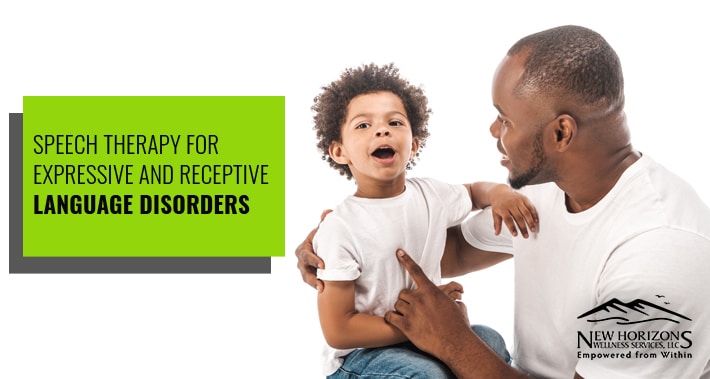
Have you ever had a conversation with a toddler or preschooler?
If you have, you know that kids come up with some unique ways of expressing and understanding as their verbal communication develops.
While many children work through the challenges of communication skills on their own over time, some kids face more persistent difficulties as they grow.
Does your child rely heavily on gestures or a limited number of phrases to try to get their point across?
Have you noticed your child having trouble forming words or completing sentences?
Do they seem confused by verbal instructions or everyday conversation?
If your child has difficulty getting their message across or understanding messages and ideas shared by others, they may have an expressive or receptive language disorder.
Here at New Horizons Wellness Services, we offer speech therapist for kids treatments that can help.
For now, let’s take a closer look at expressive and receptive language disorders.
What Is An Expressive Language Disorder?
Expressive language skills are the skills your child uses to produce speech.
If your child has difficulty getting their message across to others, they may have an expressive language disorder.
This can look like having trouble forming words, using incorrect or incomplete grammar, or having trouble starting or finishing a complete sentence or thought.
If your child has an expressive language disorder they may find it difficult to:
- Ask questions
- Use typical body language or gestures
- Learn songs and rhymes (also a sign of dyslexia)
- Start and continue a conversation
- Adjust their tone or volume
RELATED: Social Language And Communications Skills Therapy For Kids Near Me
What Is A Receptive Language Disorder?
Receptive language skills are the skills your child uses to understand things they hear, see or read.
If your child often seems to take a long time to figure out what someone has just said, if they have trouble following verbal instructions, or if they seem not to pick up the ‘rules’ of social situations, they may have a receptive language disorder.
Kids with receptive language disorders often have trouble with:
- Understanding messages and information they receive from others
- Making sense of lessons in learning settings
- Following verbal instructions
- Getting along with other children
- Responding to questions
- Identifying objects and pictures
Some of these are also signs of hearing loss, so it’s a good idea to have your child screened for that as well.
RELATED: Speech Therapy For Deaf Or Hard Of Hearing Children
What Are The Symptoms Of Expressive And Receptive Language Disorders?
If your child has expressive language disorder they might show symptoms related to how they organize speech and identify objects.
Expressive language disorder can look like:
- A small vocabulary relative to their age
- Trouble finding the right word for an object
- Stringing together words in an unusual order
- Speaking slowly, frequently stopping and starting when speaking, or using placeholder words a lot
- Using verb tenses incorrectly
- Presenting thoughts in an order that’s hard to follow
If your child has a receptive language disorder, their symptoms might show up as trouble connecting with messages and ideas from their environment and the people around them.
Receptive language disorder can look like:
- Having difficulty understanding what people have said to them
- Confusion or freezing when following directions that are spoken to them
- Not knowing how to take turns when playing in a group setting
- Having trouble pointing to a picture or object when given a verbal prompt
In addition, your child might show some behavioral signs of expressive and receptive language disorder.
Children with language disorders may act out to express their frustration, seem not to listen to instructions or follow rules, have difficulty learning in school, and experience self esteem and depression issues.
What Causes Expressive Receptive Language Disorders?
Expressive and receptive language disorders can emerge on their own as your child’s brain develops, or they can emerge after an illness, injury, stroke, or other event that impacts the brain.
Language processing disorders are linked with several genes, and a family history of language problems is seen in many children with expressive and receptive language disorders.
Some other factors that can contribute to expressive and receptive language disorders include:
- Being born premature (also a risk factor for sensory processing disorder
- Low birth weight
- Hearing loss
- Muscle weakness
- Autism spectrum disorder
- Down syndrome
- Fragile X syndrome
- Fetal alcohol spectrum disorder
- Cerebral palsy
- Poor nutrition
- Failure to thrive

Is Expressive Receptive Language Disorder Part Of ADHD?
A 2017 research review analyzed the results of 21 studies that looked at the relationship between ADHD and language disorders.
The researchers expected to find a relationship between ADHD and language disorders but were surprised at how strong the relationship turned out to be.
In their findings the researchers wrote that language disorders, including expressive and receptive disorders, should be considered as a core component of ADHD.
A lot is still unknown about how language disorders interact with ADHD and what intervention strategies will work best to support children with ADHD.
As well, there are a lot of misunderstandings and myths about ADHD among the common population.
It is clear, though, that language disorders should be considered when building skills and treatment plans for kids with ADHD.
If your child has an ADHD diagnosis, talk to a speech therapist to get a better sense of their language skills and needs.
They may also need treatment from a local pediatric occupational therapist.
RELATED: Occupational Therapy Treatments For ADHD
Can A Child Outgrow Expressive Receptive Language Disorder?
There are a couple of common myths about speech therapy and childhood development that can get in the way of proper treatment for kids with language disorders.
First, many people believe that kids will naturally grow out of their language difficulties with time.
Some children go through the typical developmental stages for language learning at a slower pace than their peers – this is known as language delay.
Children with language disorders process language differently and are unlikely to gain more language skills without supportive intervention like speech therapy and communication aids.
Second, many people think that kids who act out, don’t follow instructions, or have trouble playing with others just need firm discipline.
Most kids act out from time to time, and some benefit from conversations about appropriate behavior and consequences or from learning strategies to manage big feelings.
These types of discipline may not work because they do not help your child develop the language skills they need to be able to act differently.
When kids with expressive or receptive language disorders have trouble understanding or making themselves understood, they may cry, shout, or get aggressive.
They may do these things out of frustration or to try and get your attention.
The truth is, catching language disorders and beginning treatment early can make a big difference in your child’s development, behavior, and overall well being.
A speech therapist can work with you to identify tools and strategies that will help your child connect with their environment and express their needs more effectively.
How Can A Speech Therapist Help With Expressive Receptive Language Disorders?
A speech therapist will work with you and your child to develop a tailored approach.
Your speech therapist will talk to you, observe how your child plays in a natural setting, look at medical history, and use skills tests to get a full picture of your child’s language disorder.
Based on what they learn about your child, your speech therapist will put together an individualized plan that includes books, games, play, and one on one work with your child.
Your pediatric speech therapist can also recommend learning and communication aids to help your child in everyday life.
Book Your Appointment With New Horizons Wellness Services Today
Signs of expressive and receptive language disorders can pop up in different ways.
A teacher or childcare worker might share concerns about your child’s learning or behavior.
Your child might have a limited vocabulary or struggle to express their thoughts and needs.
Your child might have difficulty knowing how to interact with other kids or how to follow verbal instructions.
If any of these possibilities sound familiar, we can help.
Book your appointment with New Horizons Wellness Services todayto get your child the support they need.
Yours in Health,
New Horizons Wellness Services13333 SW 68th Pkwy,
Tigard, OR 97223
- https://g.page/newhws
New Horizons Wellness Services provides a true multidisciplinary approach to mental & physical health treatments for children, adults and families.
